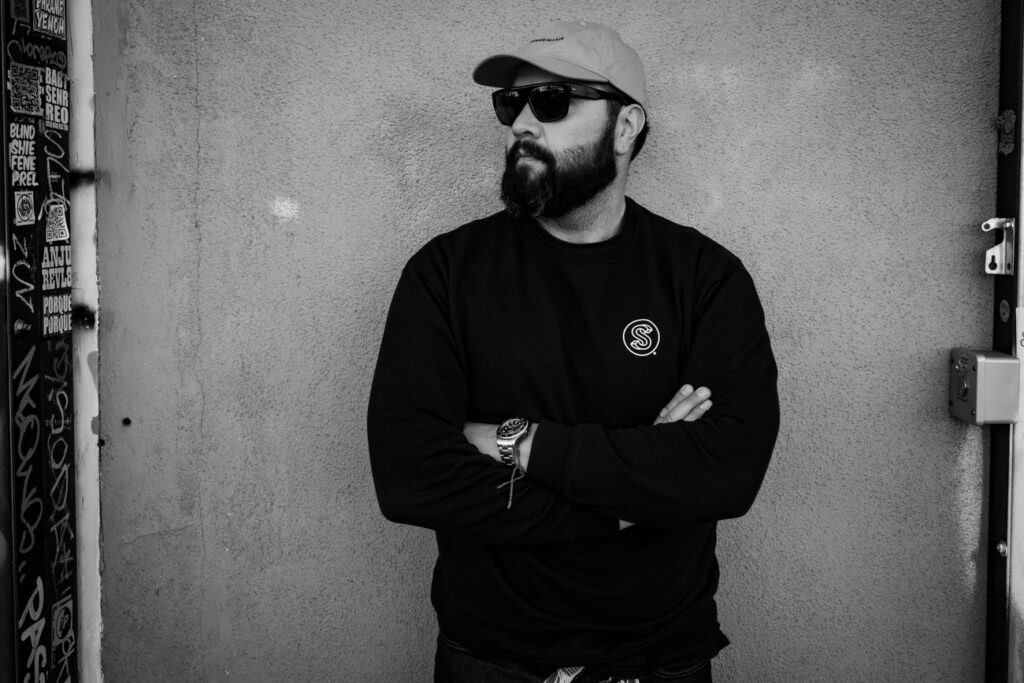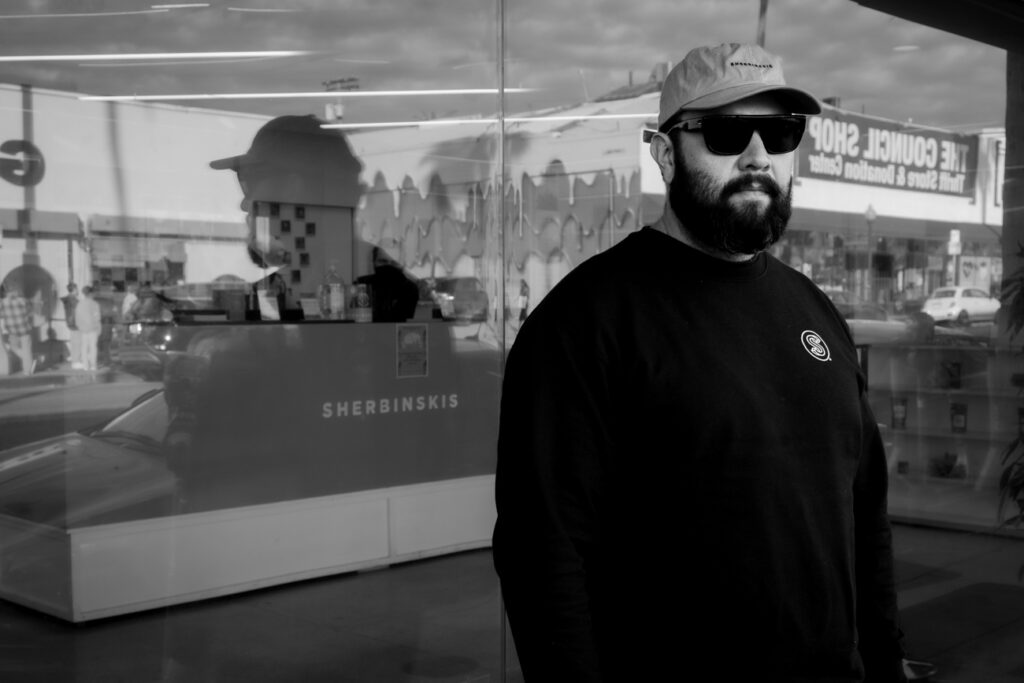Mario Guzman, an icon of California weed thanks to his creating the Gelato strain among others, talks with Visit Hollyweed about what’s next for his brand Sherbinskis. Guzman has taken the fame that he built in the past decade to contribute to science, social and political advocacy, and of course new fire genetics. Going into 2022, Guzman expects a big year for his brand Sherbinskis.
Coming from the Bay Area weed scene in the early 2000s, Mario Guzman would gain world fame as the creator of some of California’s most popular strains.
Once weed strains like Sunset Sherbert, Gelato, and other crosses hit the scene, they were almost instantly in high demand, name-checked by leading musicians and actors. The massive success propelled Guzman to fame in the worlds of fashion, music, and Cali weed.
Guzman’s own brand, Sherbinskis, is considered top-shelf exotic that is still only available in small batches. But starting in 2022, that’s about to change.
Sherbinskis has scaled up their indoor grow, which will allow much more of their high-end product to be available on the market. You’ll start to see Sherbinskis at more dispensaries, and they will be opening other stores throughout the state. Sherbinskis flower can already be found in over 50 stores in the state.
Last year, Guzman had two other important milestones that he says have fulfilled some of his longer-term personal goals as a participant in Cannabis.
Recently he published a peer-reviewed article in an academic journal* based on studies that were done of Sherbinskis’ genetics. By comparing elite strains like Gelato with other less-desirable strains, the research team that included Guzman discovered a new set of molecules that give cannabis its “gas” like smell.
The study was in partnership with Abstrax Tech and involved creating new equipment to study weed in a way that hadn’t been done before.

This is, he says, “the very beginning of us starting to study the different aspects of the plant other than just the THC and deepening our understanding of the medicinal values of the plant.”
Being listed as an author on a study in an academic journal has given important validation to the value of the genetics that Guzman has created.
“It has been a goal of mine to have something support the work that I’ve done have it be looked at by professionals and taken seriously,” Guzman said. “People can say whatever they want but when you actually get something published it’s taken seriously. I’m really excited about that and I’m hoping that it can be the first of many more contributions that I’m able to give to the cannabis space.”
Guzman’s dedication to the plant, he says, is due to his belief in its medicinal value.
“It has been a goal of mine to have something support the work that I’ve done have it be looked at by professionals and taken seriously. …When you actually get something published it’s taken seriously. I’m really excited about that.”
Mario Guzman on being a published researcher
“I come from the medical cannabis movement, a diverse group of people in the Bay area using cannabis for a long list of ailments,” Guzman said.
He says he’s seen the health benefits, and that’s what drives him to continue.
“I’ve seen my brother come off of 15 medications and bring him out of a suicidal place. He’s a 100% disabled Marine Corps veteran that has PTSD. I’ve seen it first-hand help people, our specific strains,” Guzman said.
“It’s what drives me and is at the core of what our brand is about: contributing, working with our veterans, working with our community leaders, whether it be politically, whichever way, to connect and help our communities,” he said.
The medicinal and scientific value is not the only thing that drives Guzman. He’s also deeply connected with social and reparative justice issues within the cannabis industry.
Guzman, who is of Mexican descent, is more invested than ever in supporting the minority business cannabis community, but it’s not entirely a new direction for him.
When Guzman first started Sherbinskis as a licensed brand, he pursued a second license to grow cannabis on land owned by the Tribal community of Mendocino County, who are part of the Pomo Indian tribe. Guzman was the first to get a license working with the Indigenous community.
I’m an advocate at heart. I always root for the underdog and I’m always helping people. I think I found my tribe with the MCBA. …They’re fighters, they’re warrior-spirit types.
Mario Guzman on advocacy work
“I really chose to pursue it even when we knew it was an uphill battle,” Guzman said. “I knew it was something that I really wanted to do and was something that needed to get done and that they deserved. I’m proud of the fact that we helped make that happen,” he said.
Guzman sees the cannabis industry as a way to create new business opportunities for the Indigenous communities of California. To that end, he’s introduced organic cultivation techniques and genetics to the Pomo farm that he’s working with. Sherbinskis sells the sun-grown, organic bud that’s grown on Indigenous land, making it available to consumers on the legal market.
“We’re looking to the cannabis industry and the business community to create economic prosperity for these different communities,” Guzman said.
Last year, Guzman was elected to the board of the Minority Cannabis Business Association, the largest trade organization in cannabis. So far, he says, the volunteer work he’s contributed has been motivating to him.
“It’s exciting. It’s an honor. I feel like it’s real work. I feel like it’s doing something that makes a difference, and it’s something I want to do as long as I can,” he said.
Guzman wants to help train the next generation of leaders and entrepreneurs in the cannabis space, and he wants to center those communities that were most negatively impacted by the War on Drugs.
Without such advocacy by leaders such as himself, Guzman says, big business will simply push out the local culture of weed.
“One thing I’ve realized is that legalization really does open the door for corporate business to take over cannabis. Decriminalization is I think a better way to do it. But unfortunately this legalization is being pushed. I just feel like our voice needs to be included.”
We’re looking to the cannabis industry and the business community to create economic prosperity for these different communities.
Mario Guzman on working with Tribal Communities
For Guzman, it’s important that minority groups have a seat at the table.
“Even if you want to fight big business and you don’t want it to come, I just think that it will come, and big money will move in. I think it’s our responsibility, as minorities especially, to get involved and make our voice heard so that when these opportunities come we’re not left behind,” Guzman said.
Although it’s almost like a second job, Guzman’s contributions to the MCBA involve a side of him that’s important to his work.
“I’m an advocate at heart. I always root for the underdog and I’m always helping people. I think I found my tribe with the MCBA because it’s a lot of like-minded individuals that have a passion for the plant and believe in the plant. They’re fighters, they’re warrior-spirit types.”
Guzman wants to continue to teach others about the plant as medicine, the plant as opportunity, and the plant as a cause for coming together.
“It’s truly here to unite us,” Guzman says.
*Iain W. H. Oswald, Marcos A. Ojeda, Ryan J. Pobanz, Kevin A. Koby, Anthony J. Buchanan, Josh Del Rosso, Mario A. Guzman, and Thomas J. Martin. “Identification of a New Family of Prenylated Volatile Sulfur Compounds in Cannabis Revealed by Comprehensive Two-Dimensional Gas Chromatography.” ACS Omega 2021 6 (47), 31667-31676. DOI: 10.1021/acsomega.1c04196.


